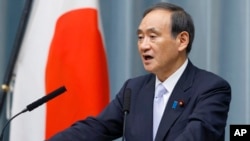Japan said on Wednesday it will not be sending election monitors to Cambodia for a general election this weekend, although Tokyo - a major donor to the Southeast Asian nation - has sent such observers for numerous elections in the past.
Cambodian Prime Minister Hun Sen is on course to extend his 33 years in power after the main opposition party was dissolved last year and following a crackdown on dissent, including civil society and independent media, prompting criticism by some that the election is a sham.
Cambodia announced on Tuesday that as many as 220 observers from 52 countries would monitor Sunday’s general elections.
Japan sent election monitors to Cambodian elections in 1993, 1998, 2003 and 2008, but Chief Cabinet Secretary Yoshihide Suga said it would not be doing so this time.
He did not give further details but noted that Japan was providing purely “practical” assistance.
“We’ve taken various opportunities to express our concerns and call on them to improve the situation,” he told an afternoon news conference when asked about Japan’s stance on Cambodia’s human rights situation.
“In order to ensure the trust of the electoral process, we have sent experts and provided machines and technical assistance. We have supported election reform in this way.”
A Japanese foreign ministry official said Japan had made the decision after they considered the situation surrounding the Cambodian election.
The election has been criticized by the United Nations and Western countries as fundamentally flawed after last year’s dissolution of the main opposition Cambodia National Rescue Party (CNRP) and the imprisonment of its leader, Kem Sokha.
Human rights activists gave Japan’s move mixed reviews.
“It’s heartening that Tokyo finally woke up to the reality that it’s not worth Japan’s time or reputation to formally send election monitors to observe a Cambodian election...in which the major opposition party is barred from participating,” said Kanae Doi, Human Rights Watch Japan Director.
“Had they gone, Japan’s observers likely would have been used as propaganda by the Cambodian government to cynically justify an election which will be neither genuine nor free and fair.”
But Doi said Japan could still do more.
“Japan should still act now to freeze any ongoing assistance to the biased National Election Commission, and prepare a post-election statement that will take a hard line in pointing out the fundamental flaws in the election,” she added.







